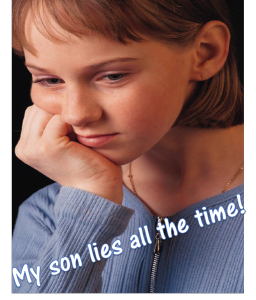A 4 yr child was brought in by his parents with the complaint that he lies often and is such a glib liar that no one suspects him.
Why does a child lie? &how should parents react?
Well, it depends on age of the child and parents’ understanding of the lie. Whatever be the circumstance, parents have to keep a cool head and avoid the commonest knee jerk reaction – shouting at/ hitting the child or blaming the other parent.
Few facts:
We hope to help initiate a process of thinking as to why a child lies; apply it your specific scenario and then decide if any professional help is necessary in tackling the situation/ behavior or how you can handle it yourself.
Children lie is a well-accepted fact. This is one skill they don’t need to be trained for. N, my 24 mth old granddaughter, once came out of bedroom, went to hergrannie and demanded apple, innocently saying ‘Mamma sleeping’ when V, her mother was standing right behind her. Once she realized she was caught, she gave a sheepish smile and went and hugged V. Such self-serving lies are the first kind of lies many young kids try out.
- A lie may also be exaggeration of a fact, twisting the truth, hiding some fact (no child ever admits that he/ she started the fight! It is always the other child) and smart children manufacture stories (they have learnt it from grandma).
- As told by a child psychiatrist, “Very young kids don’t know the difference between truth and fiction.” Another one, “In fact, this type of lying can be a sign of good things”. “Kids under 3 years of age with higher IQ scores are more likely to lie,” says a professor of psychology. “Early lying proficiency may also be linked with good social skills in adolescence.”
This does not mean we ignore all lies or start feeling proud about them.
- Why children lie?
- If your childis lying about showing his capabilities as higher than they are, he/she may actually be seeking more affection and praise to build self-esteem. The lie is actually his/ her wishful thinking. Understand that!
- Children, very often, also lie out of fear of punishment. Physical punishment actually causes a child to lie more to avoid the punishment. Hence hitting, shouting is not the way to handle a lie.
- It is observed that most, if not all, kids lie especially between the age of 4 – 6 and it may be taken as part of their healthy development process;repetitive lying at an older age,and for no apparent reason is a cause of concern as it fits the category of ‘compulsive lying’.
- Compulsive lying, especially when accompanied bybehaviourproblem such as stealing, cheating, unusual aggression, tantrums, missing school or constantly losing things etc may be taken as an indicator of something sinisterand has often been indicated in the early stages of social behaviour disorders, i.e.Attention Deficit Hyperactive Disorder.
- It never helps to ask the child ‘why are you lying?’In most cases the child does not know that he/she is lying. Commonest response may be ‘learnt from Mom!’ An innocent ‘Tell grannie that I am sleeping’ or seeing a friend’s incoming call ‘Tell her I am in bathroom’ by the mother conveys that ‘lying is allowed’. After all a child learns best by experience and from the people he/ she trusts!
How to prevent lying in the future?
- If you punish them for telling the truth, they will soon learn not to tell the truth. Your child should be able to come to you with mistakes committed, without fear of anger and punishment. This will encourage truthfulness in future.
- Most of us invite lying by asking a question that will get the child into trouble if answered truthfully. E.g. if a child has jam on his face and there is a broken jam bottle on the floor, don’t ask your child if he broke the bottle. You already know the answer.
Try to solve the problem instead of blaming the child. Say: “I see you broke the jam bottle. Come, we’ll clean it up. But be more careful in future; ask mom to open the bottle, you could have cut yourself up badly”.
- Use stories to explain to your child why lying is wrong and use the story “The Boy Who Cried Wolf”
- If lying is getting frequent, evaluate what will the gain/ obtain by lying?
- Try to get the following few points across by communicating them to your child:
- A lie is always revealed at the end.
- We will always love you and accept you no matter what, provided you are being honest with us.
- Consider getting professional help (child psychologist) for your child if:
- He/ she appears stressed.
- Tells you he/ she has been physically or sexually abused and you wonder if it is a lie. Don’t assume that it is a lie; young children typically do not have the knowledge or words to lie about being abused but older ones may have.
If you notice frequent lying, act on it strongly and immediately, it is just too important to ignore.
Dr Chander Asrani, is a post-graduate in Family Medicine. He has over 37 years in family practice and has been offering wellness and disease management services to corporates. He is soon to launch virtual clinics. He writes on various subjects of wellness; learning to live with chronic ailments and stress. Know more about him at about.me/drasrani.




So true! My counseling experience tells the same – parents teach lying to their kids by not only indulging in it but also making their kids party to that. the examples given are just perfect